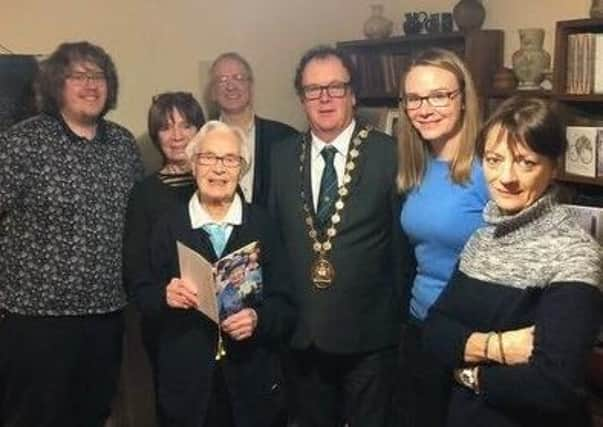VE Day memories of inspirational East Dunbartonshire woman Mary (101)


My name is Mary Lawson. I am 101 years old.
‘Called up’ aged 18, I was sent to work on ‘Work of National Importance’ and lived in London from 1938 to 1949. So experienced the Blitz,the V1s and V2 missiles and shared with a colleague a succession of damaged bed-sits which escaped three bomb raids.
So on VE Day my friend and I ‘celebrated’, if that is the correct word, on the streets of London. Unlike the famous Armistice Day of WWI, the start of VE Day was confusing.
Advertisement
Hide AdAdvertisement
Hide AdOn May 5, we heard on the BBC War Report that the German Forces had surrendered to Montgomery. Then on May 6th the news was that German General Jodl had surrendered to the Americans. Then we were told we had to wait until the Russians had their ‘surrender’ ceremony which would be on May 9 which in fact to this day they do call their VE day.
But in his great broadcast in the evening of May 7, Churchill announced that the next day would be the VE Day and that was OK with us!
Really we did not know what to do! Crowds had already collected near Buckingham Palace and the King and Queen and Churchill had ‘appeared’. About mid-day my friend and I joined a fair sized crowd which soon increased and increased so that we just got carried along in the crush with little idea where we were or where we were going.
Somewhere near Trafalgar Square there were attempts at dancing and lamp-post climbing but all the participants seemed to us to be very young. There were few men in uniform in that crowd. They were still scattered across Europe in France, Germany and Italy or still fighting in Burma or in prisoner of war camps.
Advertisement
Hide AdAdvertisement
Hide AdWe decided to go home. As we made our way along familiar streets we passed acres of desolate bomb sites, ruined buildings and patched up homes. As we approached a middle-aged couple sitting on a piece of walling, the woman said: ‘What happens now?’. Exactly our thoughts. Britain was bankrupt. It owed the USA millions of dollars for the Lease -Lend which had kept us going and would now have to be paid back.
Industry, lots of its infrastructure in ruins and a whole generation of young men and women not trained for peace time employment, had a big problem. We two had just been told that we were no longer needed in our war jobs. The man to whom my friend was to marry had been killed in Italy a year earlier.
Back in our home, where we had known some terrifying moments during the recent V1 and V2s, we made the usual cup of tea.
Suddenly I was shocked to see my friend wiping away a few tears. Crying was something which had been regarded as ‘not the done thing’ in our recent life style.
Then together we laughed. This was the day which we had for so long – six years – looked forward to, and instead we had been so miserable!!
Mary lives in Kirkintilloch.
Comment Guidelines
National World encourages reader discussion on our stories. User feedback, insights and back-and-forth exchanges add a rich layer of context to reporting. Please review our Community Guidelines before commenting.